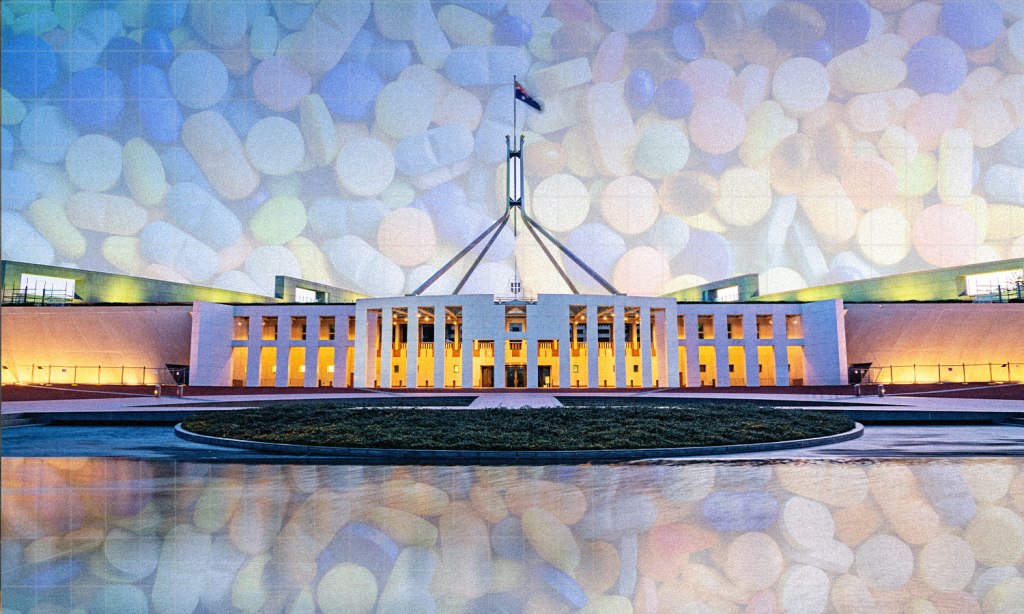The ACT Government has announced that people caught with small quantities of illicit drugs will no longer face criminal charges. Instead, people who are found to be using drugs will be given either a caution, a $100 fine, or directed to a course on drug harm.
“The ACT has led the nation with a progressive approach to reducing the harm caused by illicit drugs with a focus on diversion, access to treatment and rehabilitation and reducing the stigma attached to drug use,” said Minister for Health Rachel Stephen-Smith in a statement.
“This sensible reform is based on the expert advice that a health-focused, harm reduction approach delivers the best outcome for people using drugs.”
The reform aims to minimise the harm caused by illicit drug taking as well as the stigma that people who use drugs often face. It also diverts people away from the criminal justice system, something that disproportionally affects non-white and low-income people.
People can now carry up to 1.5 grams of cocaine, meth, MDMA, psilocybin, and amphetamine, as well as 1 gram of heroin and 1000 micrograms of LSD. It’s unclear if all can be carried at once — that would be one hell of a party.
The changes will come in from October next year, giving the ACT Government 12 months to train frontline workers and develop public messaging.
The ACT Government invests $26 million each year into alcohol, tobacco, and other drug support services. They are adding a further $13 million to this after the 2022-2023 budget.
Given that this policy, which was proposed by the ACT Greens, passed both the upper and lower houses of the ACT Parliament and has been greenlit by politicians at all levels, it seems strange to think that, just across the border in NSW, carrying drugs will get you significantly more than a $100 fine.
So, when’s this all going to change? Is the ACT an outlier in Australian drug reform or will we start to see similar policies being enacted in other states and territories? Here’s what you need to know.
Drug Decriminalisation in Australia
The ACT is way out ahead of the rest of the pack when it comes to drug reform in this country, but they weren’t the first territory to start making such moves. In 2020, the ACT legalised the personal cultivation, possession, and use of cannabis and has followed that popular policy with this latest one geared towards harm reduction.
However, all states and territories already practice some form of drug decriminalisation. In 1987, South Australia became a world leader when it opted to allow citizens to pay a fine instead of receiving a charge for minor cannabis possession. In 1996, the Northern Territory did similar, allowing anyone caught with less than 50 grams of cannabis to be issued with a fine.
In 2022, police in all states and territories have the discretion to issue fines or cautions for personal possession of cannabis — Victoria even does the same for heroin.
This however appears as far as many jurisdictions are willing to go. In February, Premier Dan Andrews slapped down a Bill to decriminalise all drug use in Victoria proposed by Reason MP, Fiona Patten.
In NSW, Premier Dominic Perottett has warned of similar after rejecting the findings of a $10 million inquiry into the harms caused by methamphetamine usage in the state. The ‘Ice’ Inquiry made the recommendation that drug use should be decriminalised in NSW to prevent further harm to people who use drugs.
“I disagree with decriminalisation [and] I want to make very clear the NSW government does not support the recommendation to decriminalise drugs in NSW,” Perrotett said last month.
However, campaigners and advocates have long said that politicians who continue to play the ‘tough on crime’ role are simply delaying the inevitable. Numerous reputable health bodies, including the United Nations, the World Health Organisation, and the Royal Australian College of Physicians have, in one way or another, said that treating drug use as a criminal matter instead of a health issue causes more harm than good.
“The world of drug prohibition is slowly dying but its replacement is slowed by difficult politics,” Harm Reduction Australia ambassador Dr Alex Wodak told Sydney Criminal Lawyers.
“For many decades, drug prohibition was a magic pudding enabling otherwise unelectable political candidates to vault into landslide victories. Today, support for drug law reform isn’t a certain political liability, while support for drug prohibition isn’t a guaranteed political asset. So, we end up now with policy monsters, which attempt to appeal to both supporters and opponents of drug law reform alike.”
Australians are also not blind to the science and the experiences of other countries. Portugal virtually solved its AIDS crisis by decriminalising drugs at the start of the century. Canada has announced that it will decriminalise drug use in a trial to attempt to curb its opioid overdose problem. US President Joe Biden recently announced he would be making cannabis legal at a federal level while Thailand switched this year from the death penalty to free-reign on cannabis.
The world is changing and polling suggests many voters understand that the issues are not helped by the current policies. Legislation changes of this magnitude are often slow to appear but the writing is quite clearly on the wall.
The latest policy shift in the ACT can only increase the likelihood of real change spreading from the capital in the coming years.
Related: Why the ACT Plans to Decriminalise Small Amounts of Illegal Drugs
Related: NSW Ministers Shout “Pass the Bong” as They Vote Down Laws to Protect Cannabis Patients
Read more stories from The Latch and subscribe to our email newsletter.

